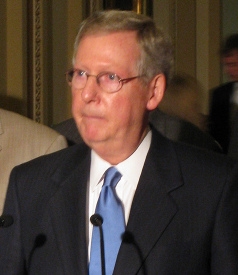Washington – Senate Minority Leader Mitch McConnell vowed to keep fighting efforts to pass a massive health care overall even as Democratic leaders declared victory following an early morning Christmas Eve vote on the Senate version of the legislation.
“There is widespread opposition to this monstrosity,” McConnell said. “This fight isn’t over. My colleagues and I will work to stop this bill from becoming law.”
The fight may not be over, but the Obama administration and Senate Majority Leader Harry Reid won a critical and protracted battle over the shape and scope of Senate health care legislation that raged for weeks. And while McConnell, along with every other GOP senator, fought until the final votes were cast early Thursday morning, Kentucky’s junior senator, Jim Bunning, skipped the critical vote.
Bunning, who is not seeking a third term and strongly opposes the Democratic health care efforts, did not respond to a request for comment.
McConnell, a lawmaker whose skill as a parliamentary tactician has long earned him begrudging nods of respect from across the aisle, debated fiercely from the floor and expertly marshaled his caucus. Still, he was unable to overcome the Democrats’ voting majority.
The Senate voted 60-39 Thursday to overhaul the nation’s health care system – President Barack Obama’s top 2009 domestic priority – moving the nation closer to near-universal health care coverage early in the next decade. The $871 billion bill would require most Americans to obtain health care coverage and would provide federal aid for those having difficulty affording it.
“Ever since Teddy Roosevelt first called for reform in 1912, seven presidents – Democrats and Republicans alike – have taken up the cause of reform,” Obama said Thursday. “Time and time again, such efforts have been blocked by special interest lobbyists who’ve perpetuated a status quo that works better for the insurance industry than it does for the American people. But with passage of reform bills in both the House and the Senate, we are now finally poised to deliver on the promise of real, meaningful health insurance reform that will bring additional security and stability to the American people.”
The health care vote was an important test for McConnell. As the titular head of a dwindled caucus, he had the difficult task of navigating his party through the Obama administration’s historic health care overhaul while ensuring that the GOP wasn’t steamrolled in the process.
When New Hampshire Sen. Judd Gregg sent Republican colleagues a memo on parliamentary strategy they could use to offer amendments and extend debate earlier this month, the move offered a clue to how McConnell intended to navigate the health care debate. Democrats quickly labeled the letter an “obstructionist playbook” and pointed to the Kentucky lawmaker as the brainpower behind Republican stall tactics.
During a tongue-in-cheek exchange on the Senate floor, McConnell and Gregg waved off the criticism and feigned confusion about the Democrats’ pique over the GOP’s “innocuous” guidance to party members.
Later, Republicans were successful in bringing proceedings to a standstill after calling for a more than 700-page amendment on including a sweeping single-payer system, offered by Sen. Bernie Sanders, a Vermont independent, be read into the record – a strategy McConnell employed during last year’s debate over a 492-page global warming bill.
In the end however, the Democrats’ 60-seat majority ensured McConnell was unable to use the tool that in past years had proved the greatest in his arsenal, the filibuster – blocking legislation by defeating efforts to cut off debate. The tenor of the Senate health care debate could foreshadow the nature of future debate on climate change legislation and reforming immigration policies.
For his part, McConnell suggested that public sentiment may yet help turn the tide on health care.
“This debate was supposed to produce a bill that reformed health care in America,” McConnell said. “Instead, we’re left with party-line votes in the middle of the night, a couple of sweetheart deals to get it over the finish line, and a public that’s outraged.”
(David Lightman and William Douglas of the McClatchy Washington Bureau contributed.)
Press freedom is under attack
As Trump cracks down on political speech, independent media is increasingly necessary.
Truthout produces reporting you won’t see in the mainstream: journalism from the frontlines of global conflict, interviews with grassroots movement leaders, high-quality legal analysis and more.
Our work is possible thanks to reader support. Help Truthout catalyze change and social justice — make a tax-deductible monthly or one-time donation today.
